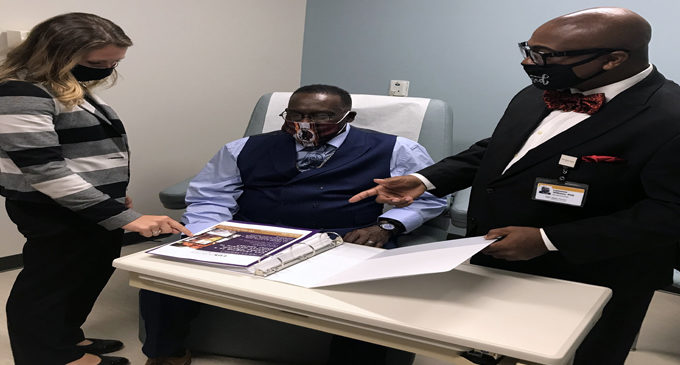Pointer Study hopes to show healthy lifestyle changes can lead to less memory loss as we age
Elizabeth Chmelo, MS, program manager, and Dr. Lamonte Williams discuss the Pointer Study with participant Ed Allen.

By Judie Holcomb-Pack
Do you ever read about health statistics and wonder, how do they know that? These statistics are often the result of controlled studies involving many people who volunteer to help researchers learn more about such things as how the food we eat affects how we age.
Local pastor Ed Allen is part of such a study, and you can participate, too!
Wake Forest Baptist Health is one of five study sites across the United States that is conducting the U.S. Pointer study. Elizabeth Chmelo, MS, is the program manager for the Pointer study and said that the study hopes to replicate the results of a Finnish study that showed promising results in memory health. The study is being funded by the Alzheimer’s Association and hopes to show that a healthy lifestyle can protect memory loss in older adults.
According to the Alzheimer’s Association, Alzheimer’s is the most common cause of dementia, a general term for memory loss and other cognitive abilities serious enough to interfere with daily life. Alzheimer’s disease accounts for 60-80% of dementia cases. Often called “the silent epidemic,” Alzheimer’s disease is more prevalent among African Americans than among whites, with estimates ranging from 14% to almost 100% higher. That is one reason studies such as the Pointer study are reaching out to minority populations to participate.
Dr. Lamonte Williams is the grassroots community organizer for Wake Health’s Pointer study and has been talking to church and community groups to explain the purpose of the study and help enroll participants. “Pointer is a community-based study,” said Williams. “I want to be out there, not in here,” he stated, but added that the pandemic has caused him to adjust his strategies for connecting with the community.
The study began in January 2019 with the goal to enroll 400 participants, but was paused in March when the COVID-19 pandemic and the stay-at-home order was issued by Gov. Cooper. Chmelo said they had to quickly review safety guidelines and change recruitment strategies to create a safe environment for both staff and participants. By mid-July they were ready to restart the study and continue engaging with participants using procedures that adhere to CDC guidelines.
Another team member, Carlo Davids, a recent Wake Forest University grad, is the study’s interventionist, which is a similar role to a health coach. He has also had to change the way he interacts with study participants. He has created virtual training sessions and has partnered with the YMCA on their outdoor classes. He helps participants develop exercise programs to lead to a healthier lifestyle. Participants stay in their assigned groups for two years and Davids said he has already seen friendships grow within the groups. One participant told him, “This is the only social contact I have.”
Williams noted that the U.S. Pointer study is intentional in seeking diversity of participants with a goal of 30% of participants being from minority populations. Participants agree to a two-year commitment to the study and are randomly placed (like flipping a coin) into one of two healthy lifestyle groups – either a “structured” or a “self-guided” group. Both groups are encouraged to engage in physical exercise, a healthy diet, mental and social activities, and regular health monitoring. Participants in one group receive information, tools, and support to help them design a lifestyle program that best fits their own individual needs and schedules. Participants in the other group receive the same information, but will complete a more structured lifestyle program. The goal is to test whether changing to one of the two different healthy lifestyle programs can protect memory and thinking as we age.
Participants must be age 60-79 years old, are not regular exercisers, and may have other risks for memory loss in the future, such as a family history of memory problems or slightly high blood pressure, cholesterol or blood sugar.
In discussing the often reluctance of minority participation, Williams said, “We have consent forms and guardrails and reviewers to protect participants.” He also noted that participants can withdraw at any time without any reason or recourse. Federal laws protect study participants from having their names or any personal information shared.
He added, “If anyone in your family has struggled with memory loss, this is a great way to affect the next generation.”
Dr. Williams is committed to helping the U.S. Pointer study be successful. He said, “My reputation is stellar and I am not going to do anything that would affect my reputation.” He believes this study will help show the need for everyone to take an active part in their health outcomes. “It is a wonderful way to improve your health and your memory.”
Allen mentioned the tests that he underwent when he began the study looked at things such as walking, balance, overall health and memory assessment. He is also participating in an ancillary study where he wears a watch that the program provided that measures his activity levels during the day and sleep patterns at night.
Why does he participate? Allen said, “I love Baptist Hospital and these are good people.” Then he added, “If you love yourself, you will be a part of this.”
If you are interested in learning more about the U.S. Pointer study, please contact 1-833-361-7591 or email pointerstudy@wakehealth.edu. If you or your church or civic group would be interested in hosting an outreach event for the study, please contact Dr. Lamonte Williams at 919-394-6180.









